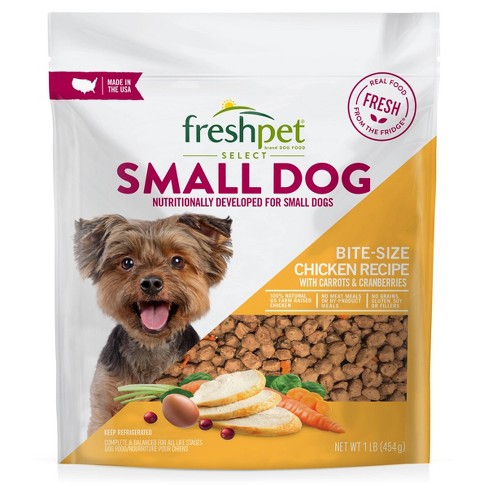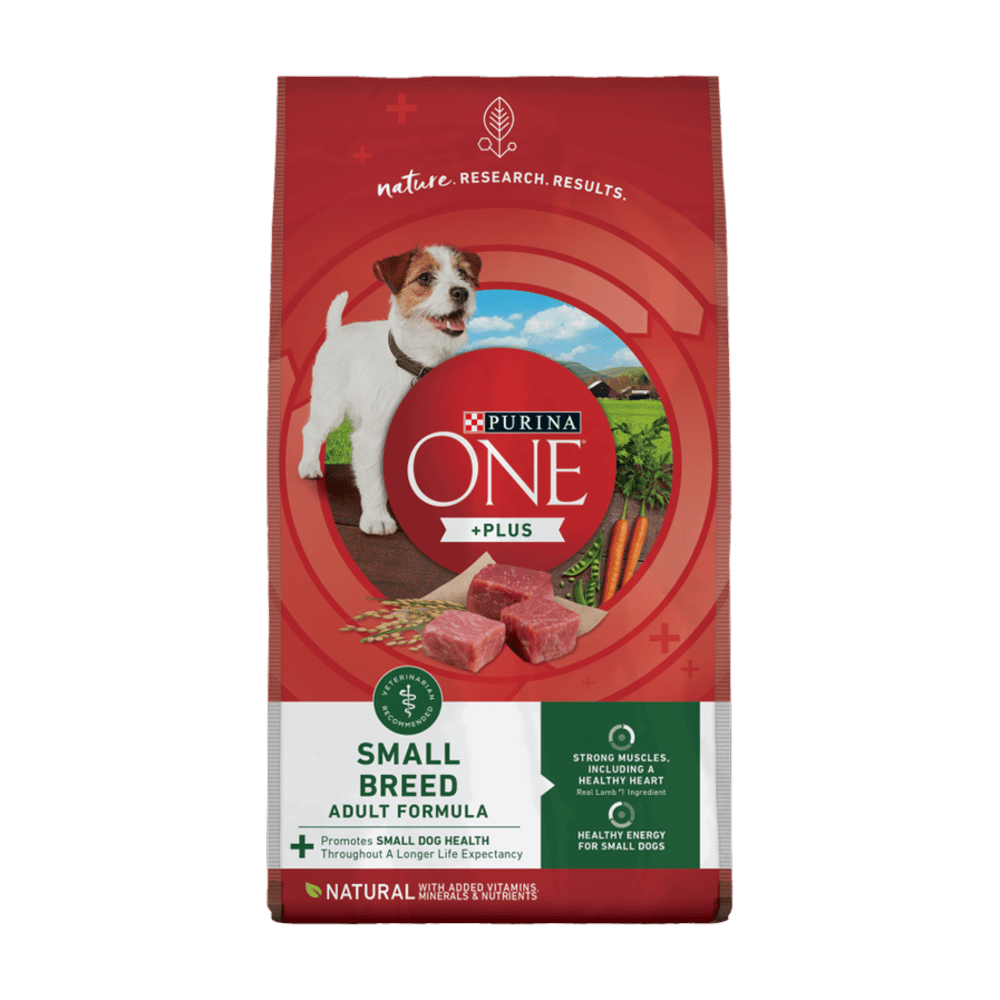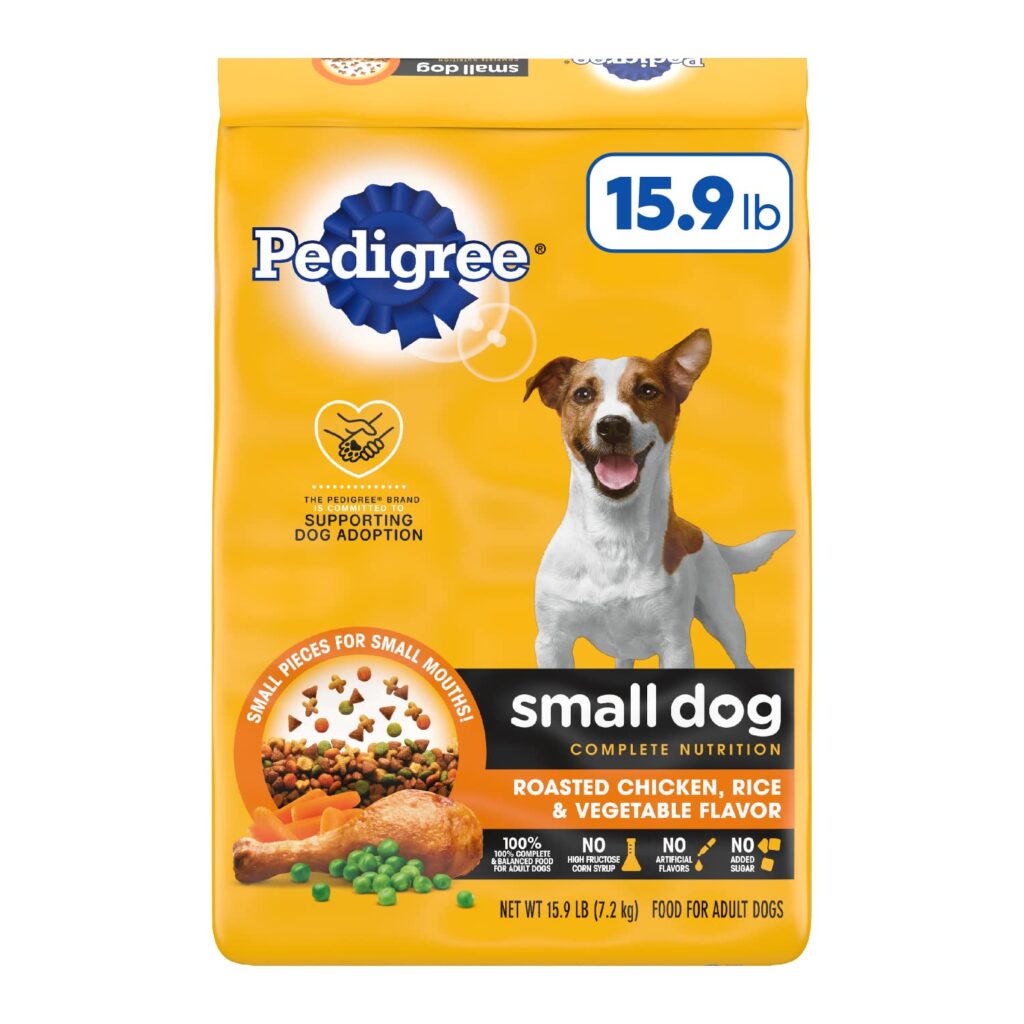Small dog food caters to the nutritional needs of smaller breeds. It ensures they receive balanced and appropriate nutrients.
Table of Contents
Small dogs have unique dietary requirements that larger breeds don’t. Their metabolism is faster, and they often have higher energy levels. Therefore, they need food specifically designed to meet these needs. Small dog food typically comes in smaller kibble sizes, making it easier for them to chew and digest.
These foods often contain higher protein and fat content to support their active lifestyles. Additionally, they are fortified with essential vitamins and minerals to promote overall health. Choosing the right food for your small dog is crucial for their well-being and longevity. Always consult with a veterinarian to ensure you’re meeting their specific nutritional needs.

Introduction To Small Dog Nutrition
Understanding small dog nutrition is essential for every pet owner. Small dogs have unique dietary needs. Providing the right food helps them stay healthy and active.
Importance Of Proper Nutrition
Proper nutrition is vital for small dogs. It ensures they grow strong and live long. Small dogs burn energy quickly. They need a diet high in proteins and fats.
Good nutrition helps maintain their weight. It also supports their immune system. Small dogs often have sensitive stomachs. High-quality food reduces digestive issues.
Common Nutritional Needs
| Nutrient | Importance |
|---|---|
| Protein | Builds muscles and repairs tissues. |
| Fats | Provides energy and supports skin health. |
| Vitamins | Boosts the immune system. |
| Minerals | Strengthens bones and teeth. |
- Proteins are crucial for muscle development.
- Fats offer energy and a shiny coat.
- Vitamins aid in overall health.
- Minerals keep bones and teeth strong.
Small dogs need specific nutrients. Their diet must be balanced and rich in essential elements. Always check the food label. Ensure it meets your pet’s nutritional needs.
Choosing The Right Dog Food
Choosing the right dog food is crucial for your small dog’s health. It ensures they get the nutrients needed for growth and energy. This guide helps you pick the best food for your furry friend.
Reading Food Labels
Understanding food labels can help you make an informed choice. Look for the Adequate Nutritional Profile on the package. This indicates the food meets nutritional standards. Check for the first ingredient listed. It should be a high-quality protein source like chicken or beef.
Ingredients are listed by weight. Higher-weight ingredients are listed first. Avoid foods with fillers like corn or soy. These provide little nutritional value.
Identifying Quality Ingredients
High-quality ingredients are vital for your dog’s health. Look for named meat sources. Avoid generic terms like “meat meal”. Named meat sources include chicken, turkey, or lamb.
Whole grains such as brown rice and oats are beneficial. They provide fiber and energy. Vegetables and fruits add vitamins and antioxidants. Avoid artificial preservatives, colors, and flavors.
| High-Quality Ingredients | Low-Quality Ingredients |
|---|---|
| Chicken, Turkey, Lamb | Meat Meal, By-products |
| Brown Rice, Oats | Corn, Soy |
| Carrots, Blueberries | Artificial Preservatives |
Choosing the right dog food ensures your small dog stays healthy. Always read labels and opt for quality ingredients. Your dog deserves the best!
Top Dry Dog Foods
Choosing the right dry dog food for your small dog is crucial. It impacts their health, energy, and happiness. In this section, we explore the top dry dog foods available. We focus on grain-free options and foods best for sensitive stomachs.
Grain-free Options
Grain-free dog foods are ideal for dogs with grain allergies. They often contain high-quality protein sources and are easier to digest.
| Brand | Protein Source | Key Benefits |
|---|---|---|
| Blue Buffalo Wilderness | Chicken | High protein, no grains, healthy carbs |
| Taste of the Wild | Bison | Real meat, probiotics, antioxidants |
| Wellness CORE | Turkey | Grain-free, high protein, omega fatty acids |
Best For Sensitive Stomachs
Some small dogs have sensitive stomachs and need special food. These foods are easy to digest and reduce stomach issues.
- Hill’s Science Diet: Uses chicken and barley. Gentle on the stomach.
- Royal Canin: Tailored for small breeds. Eases digestion.
- Purina Pro Plan: Contains salmon and rice. Promotes digestive health.


Top Wet Dog Foods
Choosing the right wet dog food can be challenging. Small dogs often have specific dietary needs. Wet dog food offers various benefits, such as better hydration and easier digestion. Let’s explore the top wet dog foods for your furry friend.
High-protein Choices
Small dogs need protein for muscle growth and energy. High-protein wet foods help meet these needs. Here are some top choices:
| Brand | Protein Content | Key Ingredients |
|---|---|---|
| Blue Buffalo Homestyle | 10% | Chicken, Beef, Carrots |
| Wellness CORE | 12% | Turkey, Chicken Liver, Spinach |
| Nature’s Logic | 11% | Duck, Salmon, Pumpkin |
Ideal For Picky Eaters
Picky eaters need flavorful and aromatic food. Wet dog foods with rich gravies and tasty meats are perfect.
- Hill’s Science Diet: Packed with chicken and barley.
- Cesar Gourmet: Comes with a variety of flavors like beef and lamb.
- Merrick Lil’ Plates: Features real meat and vegetables.
These wet foods will satisfy even the fussiest eaters. Your small dog will love the taste and texture.
Homemade Dog Food Recipes
Creating homemade dog food recipes for your small dog can be rewarding. It allows you to control the quality and ingredients, ensuring your pet gets the best nutrition. Below are some easy recipes and tips for achieving the right balance in your dog’s diet.
Simple Recipes
Here are a few simple recipes you can try at home:
- Chicken and Rice Delight
- 1 cup cooked chicken breast, shredded
- 1/2 cup cooked brown rice
- 1/4 cup chopped carrots
- 1/4 cup peas
- Beef and Sweet Potato Mash
- 1 cup ground beef, cooked
- 1/2 cup mashed sweet potatoes
- 1/4 cup green beans, chopped
- 1/4 cup spinach, chopped
Nutritional Balance Tips
Ensuring your small dog gets a balanced diet is crucial. Follow these tips:
- Include protein sources like chicken, beef, or fish.
- Add vegetables such as carrots and peas.
- Incorporate healthy grains like brown rice or quinoa.
- Use supplements if needed, like fish oil for omega-3.
Here is a simple table to guide you on proportions:
| Ingredient | Proportion |
|---|---|
| Protein (chicken, beef, fish) | 50% |
| Vegetables (carrots, peas) | 25% |
| Grains (brown rice, quinoa) | 20% |
| Supplements (fish oil) | 5% |
By following these homemade dog food recipes and tips, you can ensure your dog stays healthy and happy.
Special Diets For Small Dogs
Small dogs have unique dietary needs. Their special diets keep them healthy and happy. This section explores important aspects of small dog food.
Weight Management
Small dogs often have high energy levels. They need balanced diets to maintain a healthy weight. Overfeeding can lead to obesity, which can cause health issues.
- Choose foods with high protein content.
- Avoid foods with high fat levels.
- Monitor portion sizes carefully.
Foods with fiber can help in weight management. Fiber keeps them full and aids digestion. Look for foods with vegetables and whole grains.
Allergy-friendly Foods
Many small dogs have food allergies. Common allergens include beef, chicken, and dairy. Choosing the right food can prevent allergic reactions.
| Allergen | Alternative |
|---|---|
| Beef | Fish or Lamb |
| Chicken | Duck or Turkey |
| Dairy | Sweet Potatoes |
Look for hypoallergenic dog foods. These foods are free from common allergens. They often contain novel proteins and simple ingredients.
Feeding Schedule And Portions
Creating the right feeding schedule and determining the proper portions for your small dog is essential. Small dogs have unique nutritional needs. Their smaller stomachs require frequent, balanced meals to maintain energy and health.
Portion Control
Portion control is crucial for small dogs. Overfeeding can lead to obesity, while underfeeding can cause malnutrition. Use the feeding guidelines on the dog food package as a starting point. Adjust the amounts based on your dog’s activity level and weight.
Here is a simple guide to help you:
| Weight of Dog (lbs) | Daily Food Amount (cups) |
|---|---|
| 2-5 | 1/4 – 1/2 |
| 5-10 | 1/2 – 3/4 |
| 10-15 | 3/4 – 1 |
Keep in mind that these are general guidelines. Always consult with your vet for specific advice.
Frequency Of Meals
Small dogs benefit from frequent meals throughout the day. This helps them maintain stable blood sugar levels and energy. Most experts recommend feeding small dogs three to four times a day.
- Morning: Serve the first meal shortly after waking.
- Midday: Provide a second meal around noon.
- Afternoon: Offer a light snack in the early afternoon.
- Evening: Serve the final meal a few hours before bedtime.
Divide the total daily food amount into these meals. For example, if your dog needs 1 cup of food daily, give 1/4 cup per meal if feeding four times a day.
By following this schedule, you can ensure your small dog stays healthy, happy, and energetic.
Supplements And Treats
Choosing the right supplements and treats for your small dog is vital. These additions can boost their health and happiness. Let’s explore healthy treat options and beneficial supplements.
Healthy Treat Options
Small dogs deserve the best treats for their size and needs. Selecting treats with natural ingredients ensures they get the best nutrition. Here are some healthy treat options:
- Carrot Sticks: Low in calories, high in vitamins.
- Apple Slices: Full of fiber and vitamins.
- Blueberries: Rich in antioxidants.
- Sweet Potato Chews: Great for digestion.
- Chicken Bits: High in protein, low in fat.
These treats are not only tasty but also beneficial for your dog’s health.
Beneficial Supplements
Supplements can enhance your small dog’s diet. They help in maintaining overall health. Here are some beneficial supplements:
| Supplement | Benefits |
|---|---|
| Omega-3 Fatty Acids | Improves coat and skin health. |
| Probiotics | Supports digestive health. |
| Glucosamine | Promotes joint health. |
| Vitamin E | Boosts immune system. |
| Calcium | Strengthens bones and teeth. |
Including these supplements ensures a balanced diet for your small dog.

Frequently Asked Questions
What Is The Best Food To Feed My Small Dog?
Feed your small dog high-quality, small-breed kibble with balanced nutrients. Include lean protein, vegetables, and healthy fats.
What Is The Difference Between Small Dog Food And Regular Dog Food?
Small dog food has smaller kibble and higher calorie content. Regular dog food suits larger breeds with different nutritional needs. Small dog food often includes more protein and fat. Regular dog food focuses on balanced nutrition for adult dogs. Always choose based on your dog’s size and health requirements.
How Much Can A Small Dog Eat?
Small dogs typically eat 1/4 to 1 cup of food daily. The amount varies by age, weight, and activity level. Consult your vet.
Do Small Dogs Need Specific Food?
Yes, small dogs need specific food. Their nutritional needs differ from larger breeds. Smaller kibble size aids digestion.
What Is The Best Small Dog Food?
The best small dog food is nutritionally balanced, high-quality, and tailored to your dog’s specific needs.
How Often Should Small Dogs Eat?
Small dogs should eat 2-3 times a day to maintain energy levels and prevent hypoglycemia.
Can Small Dogs Eat Large Breed Food?
Small dogs should not eat large breed food as it may not meet their nutritional requirements and kibble size.
Conclusion
Choosing the right small dog food ensures your pet stays healthy and happy. Always consider their specific dietary needs. Quality ingredients and proper nutrition are key. Your furry friend deserves the best. Make informed choices and consult your vet for recommendations.
Prioritize your dog’s well-being with every meal.


